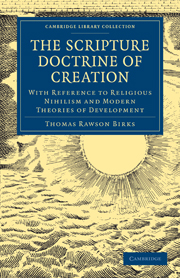 The Scripture Doctrine of Creation
The Scripture Doctrine of Creation Published online by Cambridge University Press: 29 August 2010
One main argument in favour of Religious Nihilism, or the doctrine that Theology is a wholly barren and impossible science, is drawn from M. Comte's famous law of scientific progress. Every science, it is affirmed, tends to pass on to its full perfection by three stages, the Theological, the Metaphysical, and the Positive. In the first stage, natural phenomena are referred to deities, or supernatural powers; in the second to entities, or metaphysical abstractions, such as cause, force, substance, vital power. But, in the third and last stage; Science outgrows the swaddling clothes of metaphysics and theology, and confines itself to the classification of phenomena, and to that alone. It groups these together by a cautious induction, and thus detects laws of their recurrence, which may serve for the guidance of our daily life.
Such a law, when made the basis of a scheme of philosophy, should rest either on a very wide collection of historical facts, or else on some proved necessity in the nature of human thought. But an induction, which should analyze the course of every science from the earliest ages, not only in its actual advance, but in the mental conceptions of its students, and the methods used in its discoveries, reducing the action of ten thousand minds, for thousands of years, on twenty different subjects, to one general law, is too wide and vast for any human mind to undertake with success.
To save this book to your Kindle, first ensure [email protected] is added to your Approved Personal Document E-mail List under your Personal Document Settings on the Manage Your Content and Devices page of your Amazon account. Then enter the ‘name’ part of your Kindle email address below. Find out more about saving to your Kindle.
Note you can select to save to either the @free.kindle.com or @kindle.com variations. ‘@free.kindle.com’ emails are free but can only be saved to your device when it is connected to wi-fi. ‘@kindle.com’ emails can be delivered even when you are not connected to wi-fi, but note that service fees apply.
Find out more about the Kindle Personal Document Service.
To save content items to your account, please confirm that you agree to abide by our usage policies. If this is the first time you use this feature, you will be asked to authorise Cambridge Core to connect with your account. Find out more about saving content to Dropbox.
To save content items to your account, please confirm that you agree to abide by our usage policies. If this is the first time you use this feature, you will be asked to authorise Cambridge Core to connect with your account. Find out more about saving content to Google Drive.